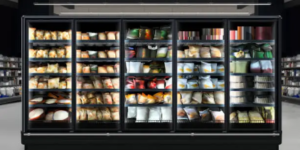Frozen foods are convenient and often healthier than their fresh counterparts. They’re processed and frozen within hours to prevent deterioration in flavour or nutrition.
And though the frozen entree section has a bad reputation for mushy texture and too much sodium, registered dietitians agree it’s worth shopping for premium quality. For more premium quality frozen food, check this out.
Why Frozen?
 Frozen foods offer various options that can help shoppers build healthier diets. Many frozen foods are low in sodium and contain more fruits, vegetables and whole grains than their fresh counterparts. Consumers can use the nutrition label and ingredient list to find options that meet their dietary preferences, including protein, plant-based, gluten-free, dairy-free and vegan.
Frozen foods offer various options that can help shoppers build healthier diets. Many frozen foods are low in sodium and contain more fruits, vegetables and whole grains than their fresh counterparts. Consumers can use the nutrition label and ingredient list to find options that meet their dietary preferences, including protein, plant-based, gluten-free, dairy-free and vegan.
Frozen ingredients are high-quality due to strict industry quality control. They are also more consistent than their fresh counterparts as freezing preserves flavour, texture and nutritional value.
In addition, frozen food costs less than fresh food because it doesn’t have the extra expense of removing stalks, pits, skins, or damaged foods. Furthermore, frozen foods don’t lose nutrients like fresh foods since they are processed quickly and stored at a lower temperature.
Better for You
Frozen food has a bad reputation for being high in salt and added sugars and low in nutritional value. However, some frozen foods can be healthy choices. Reading labels in the freezer section can help you find the best-frozen meals that meet your dietary needs.
Unlike fresh foods, which must be consumed soon after purchase, premium frozen foods have a much longer shelf life. Freezing prevents the growth of microorganisms that can cause spoilage. It can reduce food waste and save money for shoppers
Adding premium frozen foods to your shopping cart can give you more time to focus on the things that matter most. And when you are juggling a busy lifestyle, frozen food can make it easier to keep up with your healthy eating goals.
Better for the Environment
Frozen foods can reduce food waste up to six times compared to fresh alternatives. It is significant considering that one-third of all edible food produced is in landfills globally, and 45% is fresh fruit and vegetables.
Today’s frozen produce is typically processed and flash-frozen right after harvest, preserving the product’s vitamins and minerals. In comparison, fresh fruits and veggies lose their nutritional content over the days or weeks spent in a refrigerated supply chain.
Better for the Budget
With rising inflation and the cost of living pressures, consumers are searching for ways to get more value from their grocery shopping. Frozen foods are an affordable way to achieve this goal. Frozen foods can offer similar taste, nutrition, and convenience at a lower price than the fresh or chilled alternatives.
Another benefit of choosing frozen food is that it reduces waste. It is because frozen food has a longer shelf life, so it’s less likely to go bad before you can eat it. Additionally, frozen foods are often portioned, so you can cook only what you need and save the rest for another meal. For more premium quality frozen food, check this out.
To make the most of your budget, choose frozen meals from suppliers that prioritize quality and certifications. Additionally, always read labels and plan your meals ahead of time to avoid food wastage. Finally, invest in a good freezer to store your food correctly for several months.
Frozen foods provide many of the same nutrients as fresh. Just make sure that you choose frozen meals that contain vegetables, whole grains and lean protein.
Stored properly, frozen food is a convenient and affordable way to boost your vitamin, mineral and fibre intake. They’re also often cheaper than takeout or delivery.
When it comes to food, frozen products get a bad rap. The gleaming fresh produce section at the grocery store can be tempting, but it’s important to remember that frozen foods can be just as good for you as their freshly picked counterparts. From berries that retain their nutritional value to fully prepared meals that need to be thawed, high-quality frozen ingredients can have the same benefits as their fresh counterparts, with a lower cost and shorter shelf life.